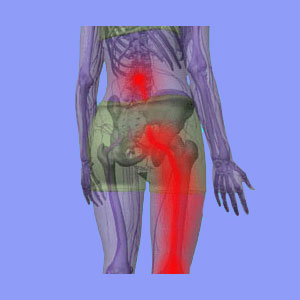
Recurring sciatica is a nightmare, since it can come and go quite unpredictably in the majority of sufferers. During the first 10 years of my own back pain torture, I endured completely irregular episodes of recurrent pain and neurological symptoms which seemed totally illogical in when and how they began. I know that some patients endure symptoms based on more predictable, but virtually unavoidable, behaviors and activities. Regardless of which type of sciatica symptoms you might have, a recurrence is always a harbinger of doom and a terrible emotional blow to suffer.
This discussion focuses on recurrent flare-ups of sciatic nerve pain.
Unpredictably Recurring Sciatica
Some patients have no clue when their next flare-up will occur. They will be able to do many vigorous and strenuous activities without any consequences, but then suddenly may be felled for no particular reason. This was my reality for many, many years. I was able to do unbelievable things with my body during martial arts training and competition, but my whole back would sometimes “go out” after spending an hour working in the garden. It seemed crazy, but eventually I figured it all out.
Many patients with variable and unpredictable pain patterns suffer from nonstructural pain syndromes, just like I did. These syndromes are often driven by a psychosomatic process and can mostly be successfully treated using knowledge therapy. Unfortunately, so many patients do not know this and spend months, years or even decades searching for relief to no avail.
Regularly Episodic Sciatica
Other patients almost always know when their sciatica will strike. However, they are likely to have a million and one different reasons why this may occur. Some of the most common scenarios for when sciatica will begin include:
Sciatica when sleeping might be linked to positional, structural or psychoemotional explanations.
Sciatica when standing for long periods of time is a common patient complaint that can be very functionally limiting.
Sciatica when sitting is a terror for anyone who must sit to work. Sciatica from driving is particularly prevalent in working people.
Sciatica from exercise and activity, such as bending and lifting, might create a physicophobia in many patients.
Sciatica from sex can cause interpersonal stress in any relationship and might completely deprive patients of this universal joy in life.
It is possible that there are purely structural explanations behind these symptomatic expressions, but these should be able to be diagnosed and successfully treated by your doctor.
Far more likely is that any of these activities are merely conditioned responses and are not inherently responsible for causing pain at all. In essence, you expect pain during a particular event and so it occurs. This is why so many doctors appear puzzled when patients report pain during seemingly innocuous activities.
Recurring Sciatica Fears
I know that recurring pain of any type is physically and psychologically draining. The constant battles just wear you down and make you lose all hope of having a normal life. These pressures are worse when you have responsibilities to take care of, such as work, family and finances. In fact, these added pressures may just turn out to be the actual cause of your pain, or at least major contributors to it.
My experience with recurrences was to relax and try not to stress over the pain. I did not accept defeat and acquiesce to a week in bed. Instead, I constantly tested my progress and resumed activity as soon as humanly possible. I tried not to worry too much about the suspected source of the flare-up, since this worry was be detrimental regardless of whether the pain turned out to be structural or not. Most of all, I never stopped trying for an accurate diagnosis, since this is the key to unlocking a cure.





